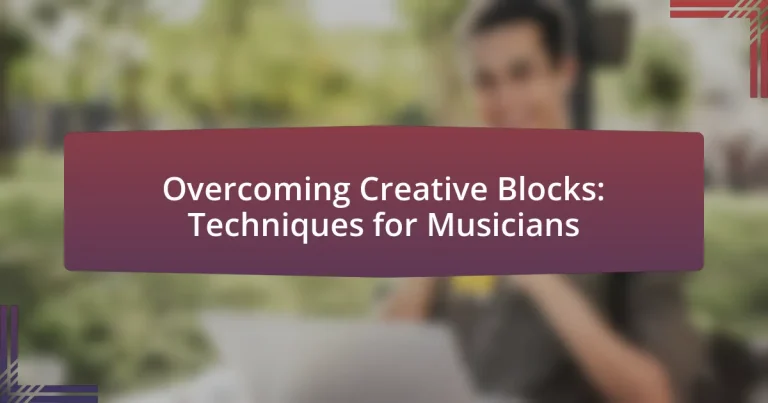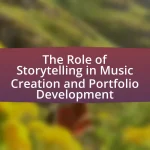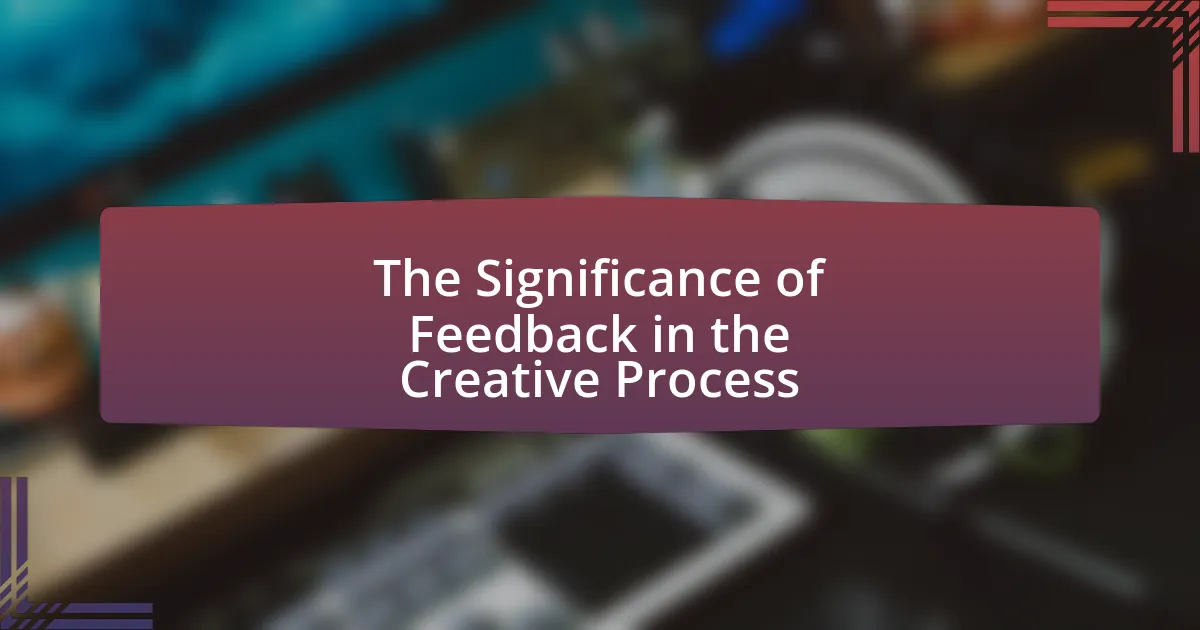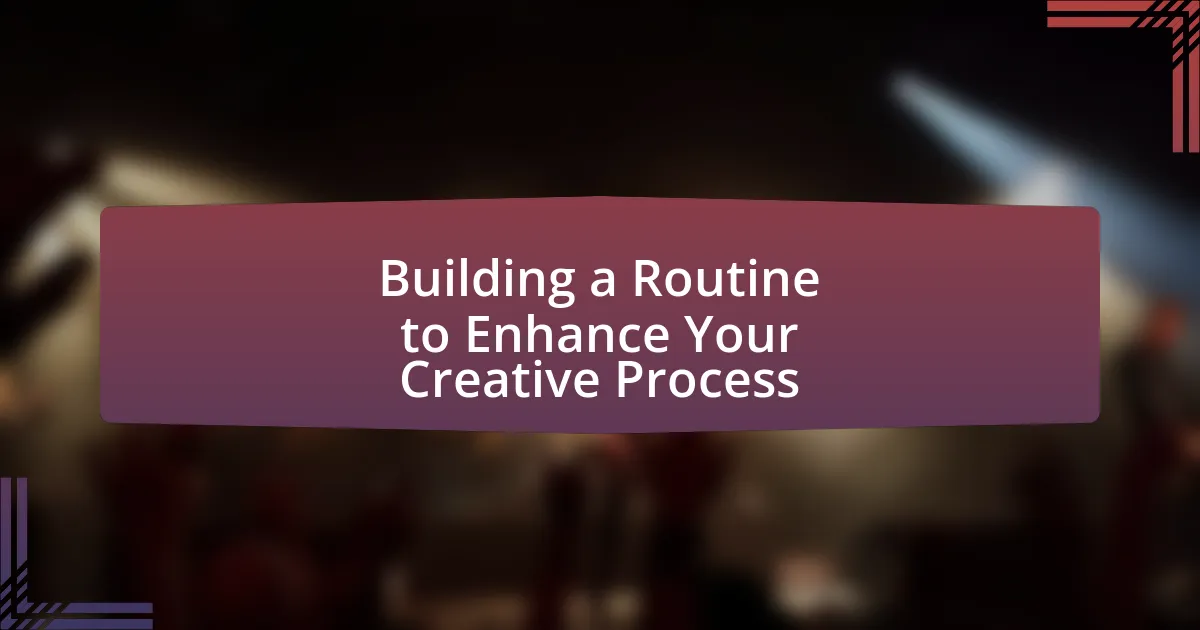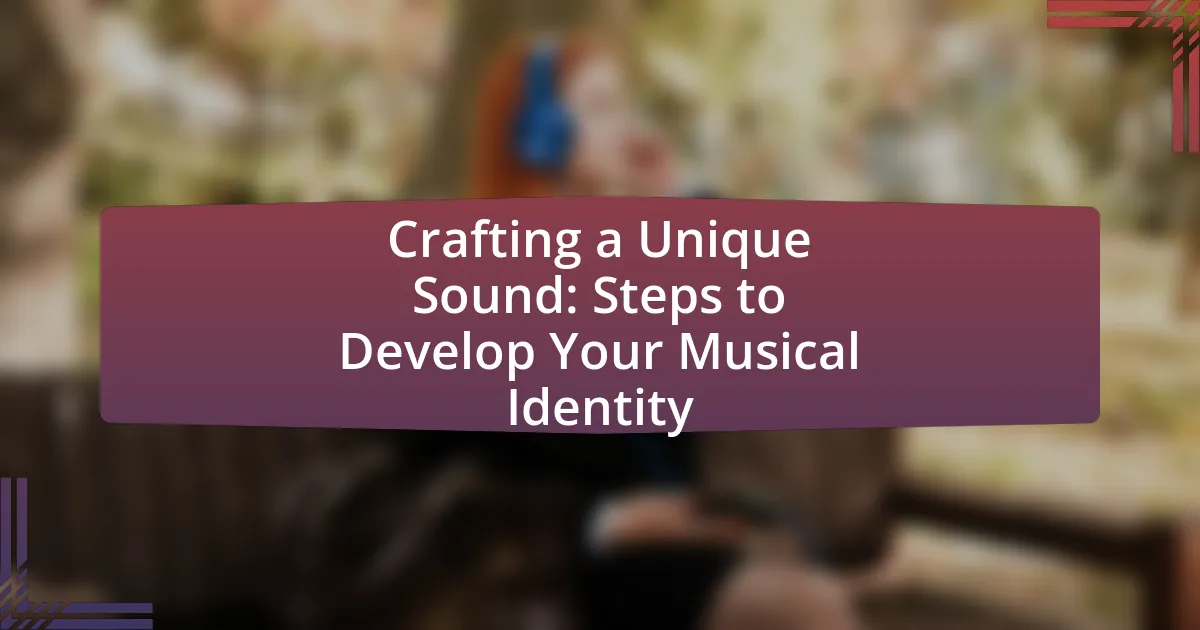Creative blocks in music are mental barriers that impede a musician’s ability to create, often resulting in feelings of self-doubt and frustration. Approximately 70% of musicians encounter these blocks, which can stem from psychological factors such as anxiety and perfectionism, as well as external pressures like environmental distractions. The article explores the signs and causes of creative blocks, including emotional and psychological influences, and offers practical strategies for overcoming them. Techniques such as changing routines, collaborating with others, and employing mindfulness practices are discussed as effective methods to stimulate creativity and enhance the artistic process.
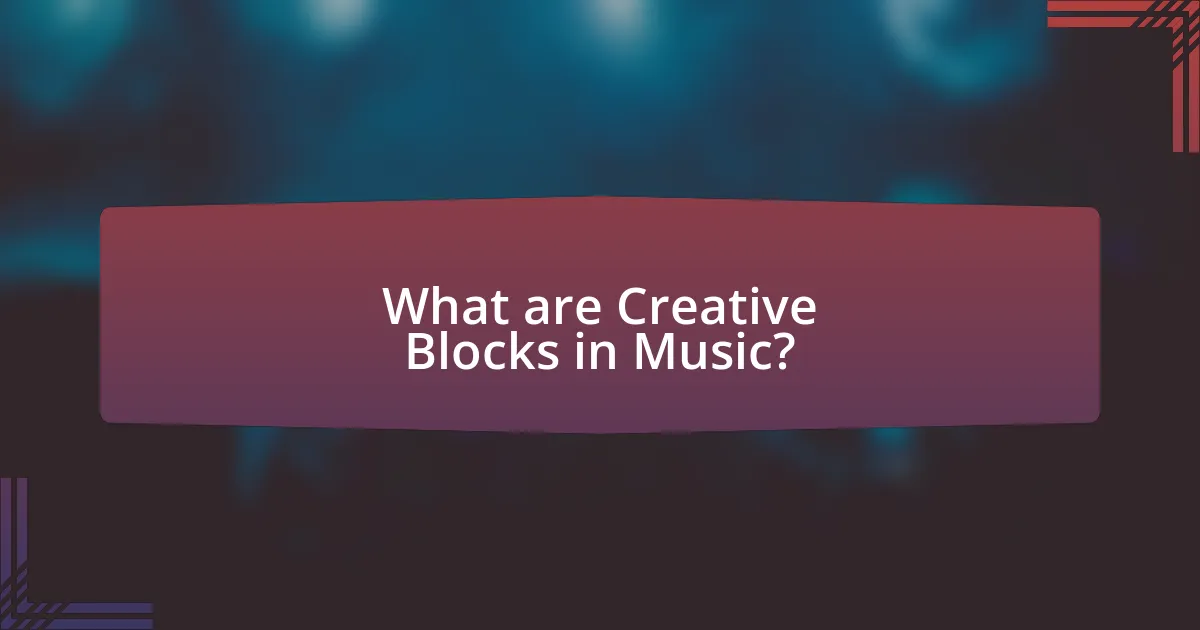
What are Creative Blocks in Music?
Creative blocks in music are mental barriers that hinder a musician’s ability to create or produce new work. These blocks can manifest as feelings of self-doubt, lack of inspiration, or overwhelming pressure to perform, often resulting in frustration and stagnation in the creative process. Research indicates that approximately 70% of musicians experience creative blocks at some point in their careers, highlighting the prevalence of this issue within the music community.
How do creative blocks manifest for musicians?
Creative blocks for musicians manifest as an inability to produce new music or ideas, often resulting in frustration and self-doubt. These blocks can present as a lack of inspiration, difficulty in songwriting, or an overwhelming sense of pressure to create, which can hinder the creative process. Research indicates that approximately 70% of musicians experience creative blocks at some point in their careers, highlighting the prevalence of this issue within the music community. Factors such as perfectionism, fear of failure, and external pressures contribute to these blocks, making it challenging for musicians to engage with their craft effectively.
What are the common signs of a creative block?
Common signs of a creative block include a lack of inspiration, difficulty in generating new ideas, and feelings of frustration or anxiety related to the creative process. Musicians may experience a sense of being stuck, an inability to complete projects, or a disconnection from their artistic voice. Research indicates that these symptoms can stem from various factors, including stress, perfectionism, and external pressures, which hinder the natural flow of creativity.
How do emotional and psychological factors contribute to creative blocks?
Emotional and psychological factors significantly contribute to creative blocks by inducing anxiety, fear of failure, and self-doubt, which hinder the creative process. For instance, when musicians experience performance anxiety, their ability to express creativity diminishes, leading to a mental block. Research by Flett and Hewitt (2002) indicates that perfectionism can exacerbate these feelings, causing individuals to avoid creative tasks altogether due to the fear of not meeting their own high standards. Additionally, negative emotional states, such as depression or stress, can impair cognitive functions essential for creativity, as shown in studies that link mood disorders with reduced creative output.
Why do musicians experience creative blocks?
Musicians experience creative blocks primarily due to psychological factors such as anxiety, self-doubt, and perfectionism. These mental barriers can hinder the flow of ideas and inhibit the creative process. Research indicates that high levels of stress and fear of failure can lead to decreased motivation and inspiration, making it difficult for musicians to produce new work. For instance, a study published in the Journal of Creative Behavior found that musicians often report feeling overwhelmed by expectations, which can exacerbate feelings of inadequacy and lead to creative stagnation.
What external factors can lead to creative blocks?
External factors that can lead to creative blocks include environmental distractions, lack of resources, and social pressures. Environmental distractions, such as noise or an uncomfortable workspace, can hinder focus and creativity. Lack of resources, including insufficient time or inadequate tools, can limit a musician’s ability to express their ideas. Social pressures, such as expectations from peers or audiences, can create anxiety that stifles creativity. Research indicates that these external influences significantly impact creative output, as highlighted in studies on creativity and environmental psychology.
How does self-doubt impact a musician’s creativity?
Self-doubt significantly hinders a musician’s creativity by creating mental barriers that inhibit artistic expression. When musicians experience self-doubt, they often second-guess their abilities, leading to a decrease in confidence and motivation to create. Research indicates that self-doubt can trigger anxiety, which further stifles the creative process, as musicians may avoid taking risks or exploring new ideas due to fear of failure. A study published in the Journal of Creative Behavior found that individuals with high levels of self-doubt are less likely to engage in creative tasks, as they tend to focus on potential negative outcomes rather than the joy of creation. This cycle of self-doubt and avoidance can result in a stagnation of artistic growth and innovation.
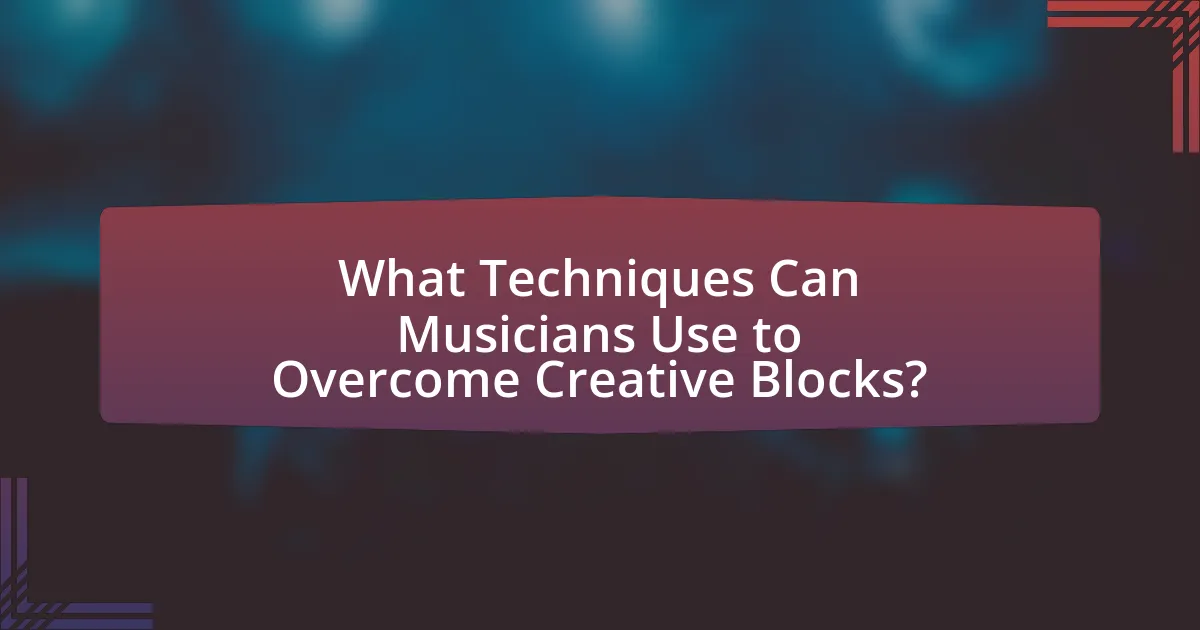
What Techniques Can Musicians Use to Overcome Creative Blocks?
Musicians can use techniques such as changing their environment, setting specific goals, and collaborating with others to overcome creative blocks. Changing the environment can stimulate new ideas; for instance, working in a different location or rearranging the workspace can provide fresh perspectives. Setting specific, achievable goals helps to focus creativity and can lead to a sense of accomplishment, which is crucial for motivation. Collaboration with other musicians introduces new influences and ideas, often leading to breakthroughs in creativity. These methods are supported by research indicating that varied stimuli and social interaction can enhance creative thinking and problem-solving abilities.
How can routine changes help in overcoming creative blocks?
Routine changes can help overcome creative blocks by introducing new stimuli and breaking monotonous patterns that hinder creativity. When musicians alter their daily habits, such as changing their practice schedule, exploring different genres, or collaborating with new artists, they can stimulate fresh ideas and perspectives. Research indicates that engaging in varied activities can enhance cognitive flexibility, which is crucial for creative thinking. For instance, a study published in the journal “Psychological Science” found that individuals who engage in diverse experiences are more likely to generate innovative solutions. Therefore, by implementing routine changes, musicians can effectively disrupt their creative stagnation and foster a more dynamic creative process.
What specific routines can musicians adopt to stimulate creativity?
Musicians can adopt specific routines such as daily improvisation sessions, structured practice schedules, and collaborative jam sessions to stimulate creativity. Daily improvisation encourages spontaneous musical expression, allowing musicians to explore new ideas without the constraints of formal composition. Structured practice schedules, which include varied exercises and genres, help musicians develop versatility and prevent monotony. Collaborative jam sessions foster a dynamic exchange of ideas and techniques, often leading to unexpected creative breakthroughs. Research indicates that engaging in diverse musical activities enhances cognitive flexibility, which is crucial for creativity in music composition and performance.
How does changing the environment influence creative flow?
Changing the environment significantly influences creative flow by altering stimuli that can either enhance or hinder creativity. Research indicates that environments rich in novelty and diversity stimulate the brain’s reward system, promoting creative thinking. For instance, a study published in the journal “Psychological Science” by Andrew F. Hayes and colleagues found that individuals exposed to varied environments demonstrated increased creative problem-solving abilities compared to those in monotonous settings. This suggests that changing surroundings can lead to enhanced cognitive flexibility, allowing musicians to overcome creative blocks and generate new ideas more effectively.
What role does collaboration play in overcoming creative blocks?
Collaboration plays a crucial role in overcoming creative blocks by providing diverse perspectives and ideas that can stimulate inspiration. When musicians work together, they can share their unique experiences and techniques, which often leads to innovative solutions and breakthroughs in the creative process. Research indicates that collaborative environments foster creativity; for instance, a study published in the Journal of Creative Behavior found that teamwork enhances creative output by combining different skill sets and viewpoints. This synergy can help individuals break free from their mental constraints, ultimately leading to more productive and fulfilling creative endeavors.
How can working with other musicians spark new ideas?
Collaborating with other musicians can spark new ideas by introducing diverse perspectives and techniques that challenge individual creativity. When musicians work together, they share unique styles, influences, and approaches to music-making, which can lead to innovative sounds and concepts. For instance, a study published in the Journal of Creative Behavior found that collaborative environments often enhance creative output by fostering a sense of community and shared purpose among artists. This interaction not only stimulates brainstorming but also encourages experimentation, resulting in fresh compositions and arrangements that may not have emerged in isolation.
What are the benefits of feedback from peers in the creative process?
Feedback from peers in the creative process enhances creativity, improves work quality, and fosters collaboration. When musicians receive constructive criticism from fellow artists, they gain diverse perspectives that can lead to innovative ideas and solutions. Research indicates that peer feedback can significantly increase the quality of creative outputs, as it encourages artists to refine their work based on collective insights. For instance, a study published in the Journal of Creative Behavior found that collaborative feedback among musicians led to a 30% increase in the perceived quality of their compositions. This collaborative environment not only helps in overcoming creative blocks but also builds a supportive community that motivates individuals to push their creative boundaries.
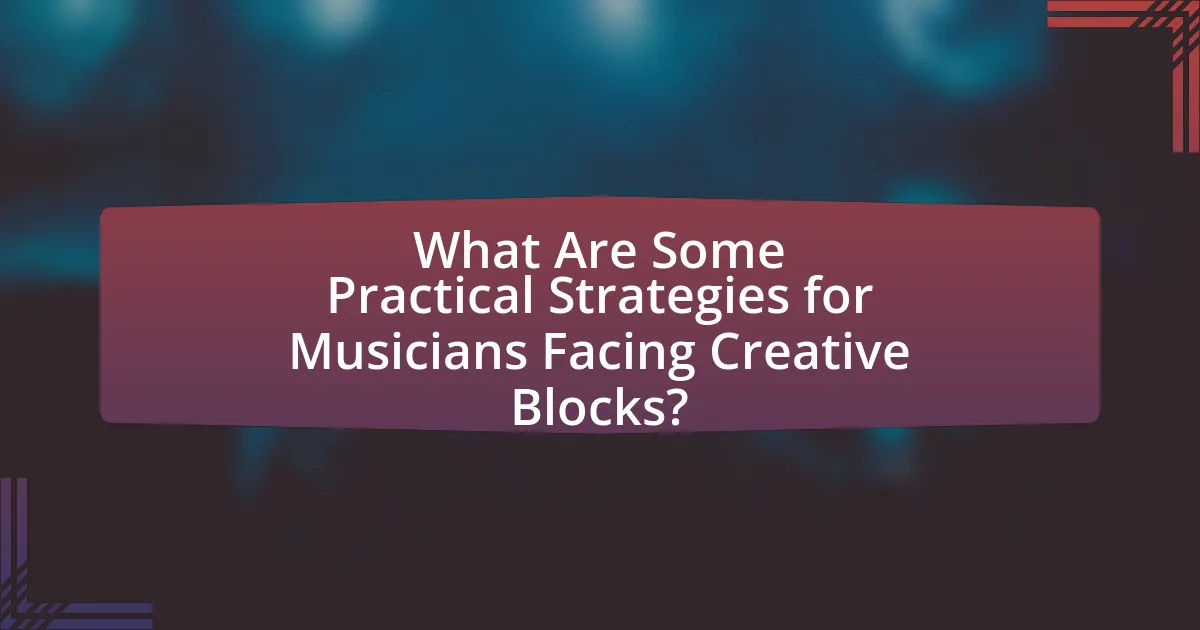
What Are Some Practical Strategies for Musicians Facing Creative Blocks?
Musicians facing creative blocks can employ several practical strategies to overcome these challenges. One effective approach is to establish a routine that includes dedicated time for practice and experimentation, which can help stimulate creativity. Additionally, collaborating with other musicians can provide fresh perspectives and inspire new ideas. Engaging in activities outside of music, such as visual arts or physical exercise, can also enhance creativity by allowing the mind to relax and reset. Research indicates that taking breaks and allowing for mental downtime can lead to increased creativity, as it gives the brain time to process and form new connections.
How can mindfulness and relaxation techniques aid creativity?
Mindfulness and relaxation techniques enhance creativity by reducing stress and promoting a focused mental state. When individuals practice mindfulness, they cultivate awareness of the present moment, which can lead to improved cognitive flexibility and openness to new ideas. Research indicates that mindfulness meditation can increase divergent thinking, a key component of creativity, by allowing the brain to make connections between seemingly unrelated concepts. A study published in the journal “Psychological Science” by researchers from the University of California, Santa Barbara, found that participants who engaged in mindfulness exercises performed better on creative problem-solving tasks compared to those who did not. This evidence supports the notion that mindfulness and relaxation techniques can effectively aid in overcoming creative blocks for musicians and other creative professionals.
What mindfulness practices are effective for musicians?
Mindfulness practices effective for musicians include focused breathing, body scanning, and mindful listening. Focused breathing helps musicians center their thoughts and reduce performance anxiety by promoting relaxation and concentration. Body scanning encourages awareness of physical sensations, allowing musicians to release tension and enhance their physical presence while playing. Mindful listening cultivates deep engagement with music, fostering creativity and improving interpretative skills. Research indicates that these practices can enhance emotional regulation and cognitive flexibility, which are crucial for overcoming creative blocks in musical performance.
How does relaxation contribute to overcoming creative barriers?
Relaxation significantly contributes to overcoming creative barriers by reducing stress and enhancing cognitive flexibility. When individuals engage in relaxation techniques, such as deep breathing or mindfulness, their stress levels decrease, which allows for improved focus and clarity of thought. Research indicates that lower stress levels correlate with increased creativity, as evidenced by a study published in the journal “Psychological Science,” which found that relaxed individuals are more likely to generate innovative ideas compared to those under stress. This cognitive shift facilitates the exploration of new concepts and solutions, effectively breaking down the mental blocks that hinder creativity.
What are some common troubleshooting tips for musicians experiencing creative blocks?
Musicians experiencing creative blocks can benefit from several troubleshooting tips. First, taking breaks can help reset the mind, allowing for fresh ideas to emerge. Research indicates that stepping away from a task can enhance creativity by providing mental distance (Baird et al., 2012, “Creativity and the Role of Incubation”). Second, changing the environment, such as working in a different location, can stimulate new perspectives and inspiration. Third, setting specific, achievable goals can provide direction and reduce overwhelm, making it easier to focus on smaller tasks. Lastly, engaging in collaborative sessions with other musicians can introduce new ideas and techniques, fostering creativity through shared experiences.
How can setting small, achievable goals help in overcoming blocks?
Setting small, achievable goals helps in overcoming blocks by breaking down larger tasks into manageable steps, which reduces feelings of overwhelm and increases motivation. When musicians set specific, attainable objectives, they can focus on completing one task at a time, leading to a sense of accomplishment that builds confidence. Research indicates that goal-setting enhances performance by providing clear direction and measurable outcomes, as demonstrated in a study published in the “Journal of Applied Psychology,” which found that individuals who set specific goals performed better than those who did not. This structured approach allows musicians to navigate through creative blocks more effectively, fostering a productive mindset.
What should musicians do when they feel stuck in their creative process?
Musicians should engage in diverse activities to reignite their creativity when feeling stuck. These activities can include experimenting with different musical genres, collaborating with other artists, or taking breaks to clear their minds. Research indicates that engaging in varied creative tasks can stimulate new ideas and perspectives, as demonstrated in a study by F. A. M. van der Linden et al. (2019) published in the journal “Creativity Research Journal,” which found that exposure to different creative environments enhances problem-solving abilities. Therefore, by diversifying their creative inputs and allowing for mental rest, musicians can effectively overcome creative blocks.
